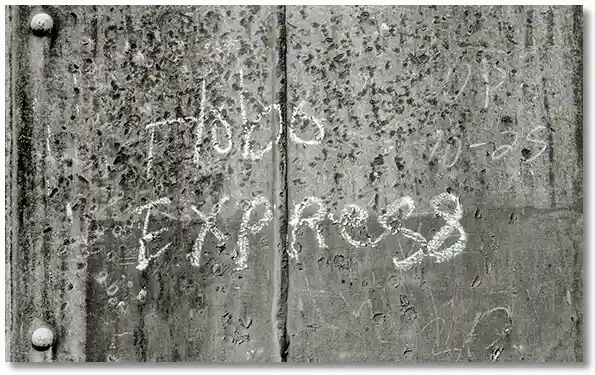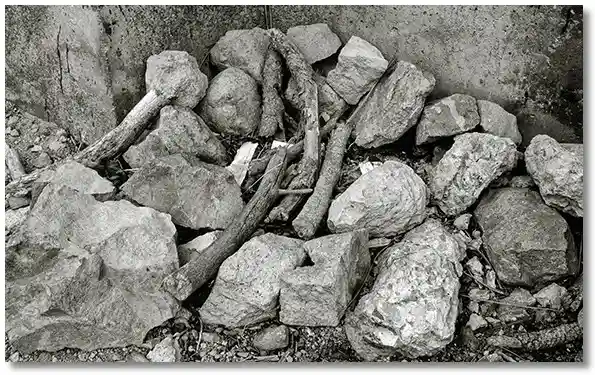I Read, Therefore I Am
books make the man
A good friend of mine, whom I never really knew, was a tramp I'll refer to as Hank. He was on the Food Stamp circuit and had several "identities". I wasn't sure what his real name was, but he said to call him Hank so I did.
He had a hooch near the north end of the Spokane BN yard, and even if I had a train to catch I'd try to make it over there just to say Hi and see how he was doing. He was a big Black man, and imposing as he looked, he had the demeanor of someone completely different. It was almost as if there was a smaller, gentler, more intelligent person residing in the body of a sometimes frightening looking big Black tramp.

The first time I met him he scared the crap out of me. It was a hot summer day and I got up from where I was sitting next to the tracks to find a place to pee. I walked under a low bridge to get out of sight and the transition from bright sun to deep shade made it hard to see anything right away. Just as I started to pee I nearly jumped straight up when I heard a loud "Oh Hell no!" coming from what seemed like a few feet away from me. I squinted into the darkness and barely made out the figure of Hank — his skin was black, his coveralls were black, and everything around him looked black until my eyes became accustomed to the darkness.
He then got up and, almost in the same sentence, introduced himself, asked me who the hell I was, and explained why he was so territorial about the spot I was about to pee on. The problem was that he had what has now been swallowed up in Political Correctness, but at the time was known as a Thick Negro Dialect. As I listened to him talk I discovered that it was masked by the fact that he was prone to mumbling, and had a pronounced slurring of his speech when he had been drinking. These factors made understanding what he was saying a challenge, to say the least, but I was up for a challenge, as he turned out to be a very interesting person.
It ended up that the ground where I was about to pee on was actually his "treasure trove", or something similar sounding. It was an area where he would toss interesting things that he came across during his meanderings around the yard in search of cans to recycle for money. Now that I was able to see things in the shade I discovered that he had quite a collection of what might be called "junk" — sort of like what you'd come across washed up on a beach after a storm. There were plastic combs, broken sunglasses, at least three different cheap sandals (all for the right foot), and numerous coins.
The more we talked, the more I understood the significance of the place. The time that Hank spent in his hooch was taken up with memories of his past — someplace he never talked about, I never asked about, and a place that he obviously wanted to forget but couldn't. His treasures, on the other hand, represented the present, and he embraced them for whatever meaning they could offer him. He would sit and stare at a comb, for example, and wonder who used to own it, and why and how they could possibly lose something so important.
We spent a lot of time under the bridge gazing at his treasures, partly to get out of the summer heat, and partly so I could try and understand him better. We both pondered the fact that up until that moment he had only come across three sandals, and although they were all different styles and sizes, they were all from the right foot. Once we got a buz on — him from beer and me from wine — we would try and figure out why people would only lose their right sandal, and how they could walk very far without realizing that it was gone. Simple facts like this would convulse us into laughter, and I found myself able to narrow my focus to just what we were talking about, and leave the rest of the World, and train riding, to another time.

At one point we found ourselves talking about a 1949 penny he had found somewhere, and we went back and forth trying to decide which was more logical — was it a fairly new penny that someone had lost over 60 years ago, or an old penny that was lost a few weeks ago? Another topic was the various rock specimens that he had collected. A lot of them he had found in or on freight cars, or along the ballast in the yard. Most, if not all of these rocks were not a type that you would normally find in the Spokane area. The ballast could have come from quarries in other states, and the rocks he found inside empty gondolas or boxcars could have been missiles aimed at passing hoboes by kids living who knows where.
We both cracked up thinking about archaeologists hundreds of years in the future digging up his hooch and trying to explain why the rocks in this area matched nothing local, and maybe thinking that there used to be a village here where people made sandals for amputees that only required a right foot to be shod. I suggested that he should arrange the items in some logical fashion, so that their position, when dug up, might suggest a house of some sort. He agreed instantly, and promised to try and find some kitchen utensils to place where the "kitchen" might have been, and so forth.
At one point I completely lost touch with the conversation when he suggested that when one of the future archaeologists discovered the remains of his "house" they might be viewed by their colleagues as being possessed and be required to exercise. This stopped me in my tracks until I figured out that he meant for them to be "exorcized", rather than to get some exercise.
At times when the conversation lagged, he would fill it in with stories of his train rides to pick up Food Stamps. He was, as the saying went, triple-dipping in Washington, Oregon, and California. Somehow he managed to obtain credible ID's for every state, and managed to get his appointment times juggled so that the vagarities of travel by train would allow him to make them on time. Even his photos were different for each state, and facial expressions and different clothes added to their authenticity. I never asked about what he did with all of the money he must have got from selling his stamps once he returned, and assumed that it was sent back to someone or someplace in his "past", as he certainly didn't have what could be called a high flying lifestyle.
I never asked to see the inside of his hooch and he never offered — we spent all of our time together hanging out in the "veranda", as he called it. Aside from his pile of treasures, the rest of his household area was remarkably clean. There wasn't a can or bottle to be seen anywhere around the place, which was a minor miracle considering all the tramps that hung around there waiting for a train. My favorite spot was the corner of a nearby warehouse, which was a popular drinking spot. There was an empty barrel propped up against a brick wall, and this apparently served as a "basket" to be used to catch beer cans and wine bottles as they were emptied and thrown in its direction. It was safe to say that the local tramps were no threat to the NBA, as there were the remains of many more bottles and cans outside than there were inside of the barrel. Hank had gone to the trouble of placing a few old pillows and sofa cushions around the barrel in hopes of preventing breakage, but I didn't see that being too effective.

When he was by himself he must have done a considerable amount of reading, because there were several large onion sacks filled with paperbacks leaning against his hooch. He explained that it was all part of his "Master Plan", as he called it. Whatever money was left over after purchasing food and alcohol, he would spend on paperbacks. The new ones were stored in one sack, and the ones he has already read were in another, which he would carry over to the Salvation Army and drop off. Getting back to his Master Plan, after he finished a book, he would tear out the last few pages to keep as fire starters, leaving the future readers to have a fit when they got to the end and discovered the missing pages. He would laugh out loud every time he thought of their reaction to his "crime", but he made it known that before he bought any book whatsoever that he would first check to see if it had the final few pages intact.
Hank was often the high point of any train trip that brought me through Spokane, and I was deeply saddened to arrive at the bridge one day and find his hooch, and the surrounding trees gone, and a chainlink fence in place to keep anyone out. I walked around for a few minutes, but couldn't work up any enthusiasm to hang out, and as I walked away I stopped to pick up a rain-soaked paperback and turned to the back cover. The last few pages were missing. I never read the book — I don't even know what it's about — but I still have it on my bookshelf at home 20 years later.